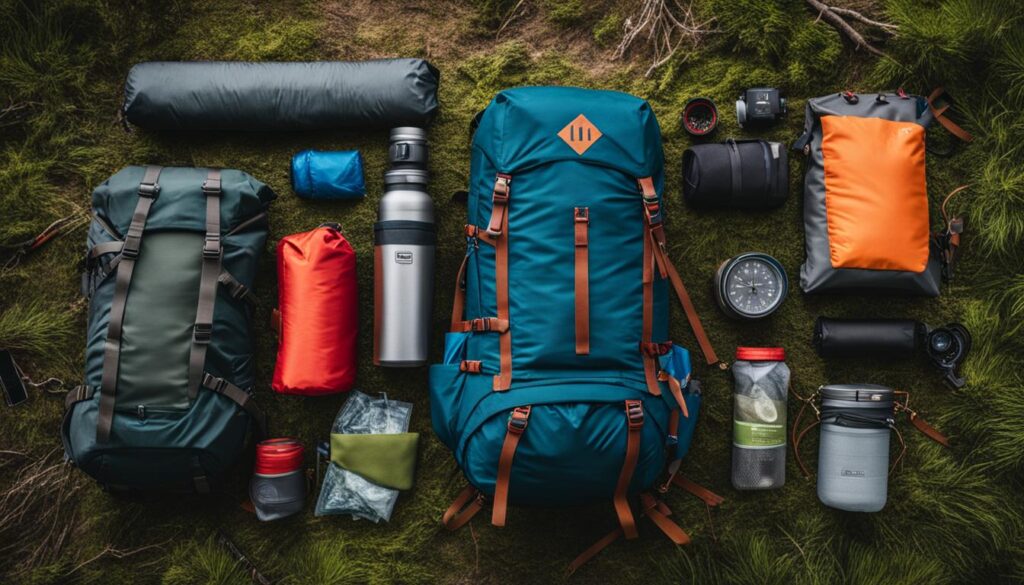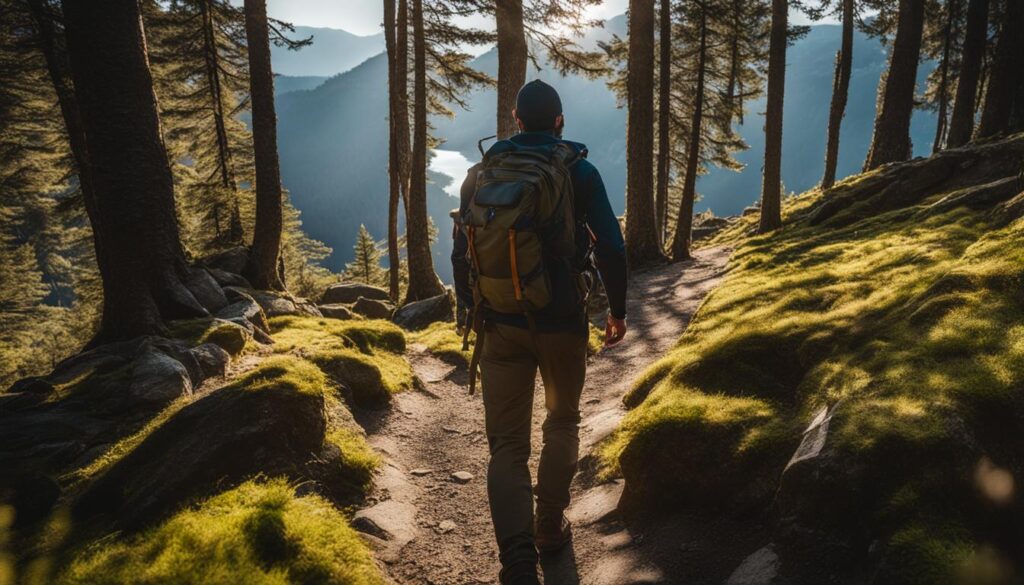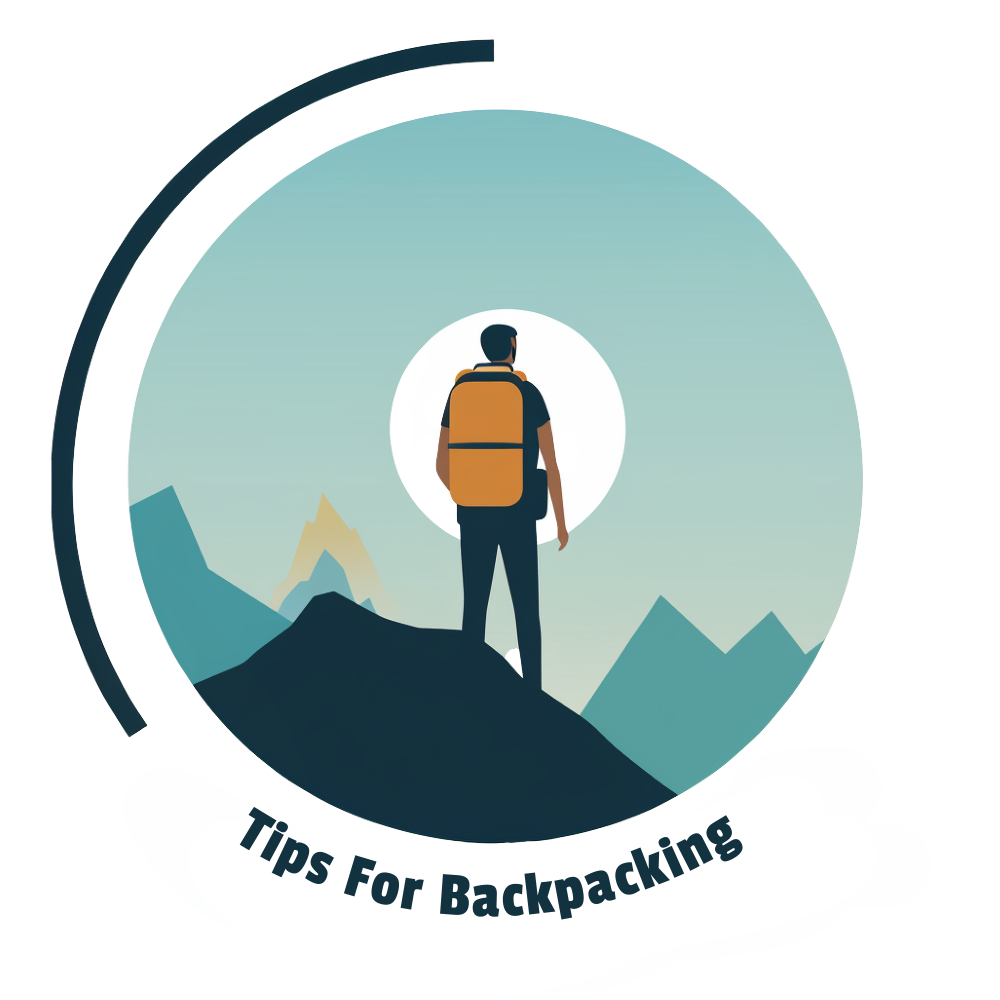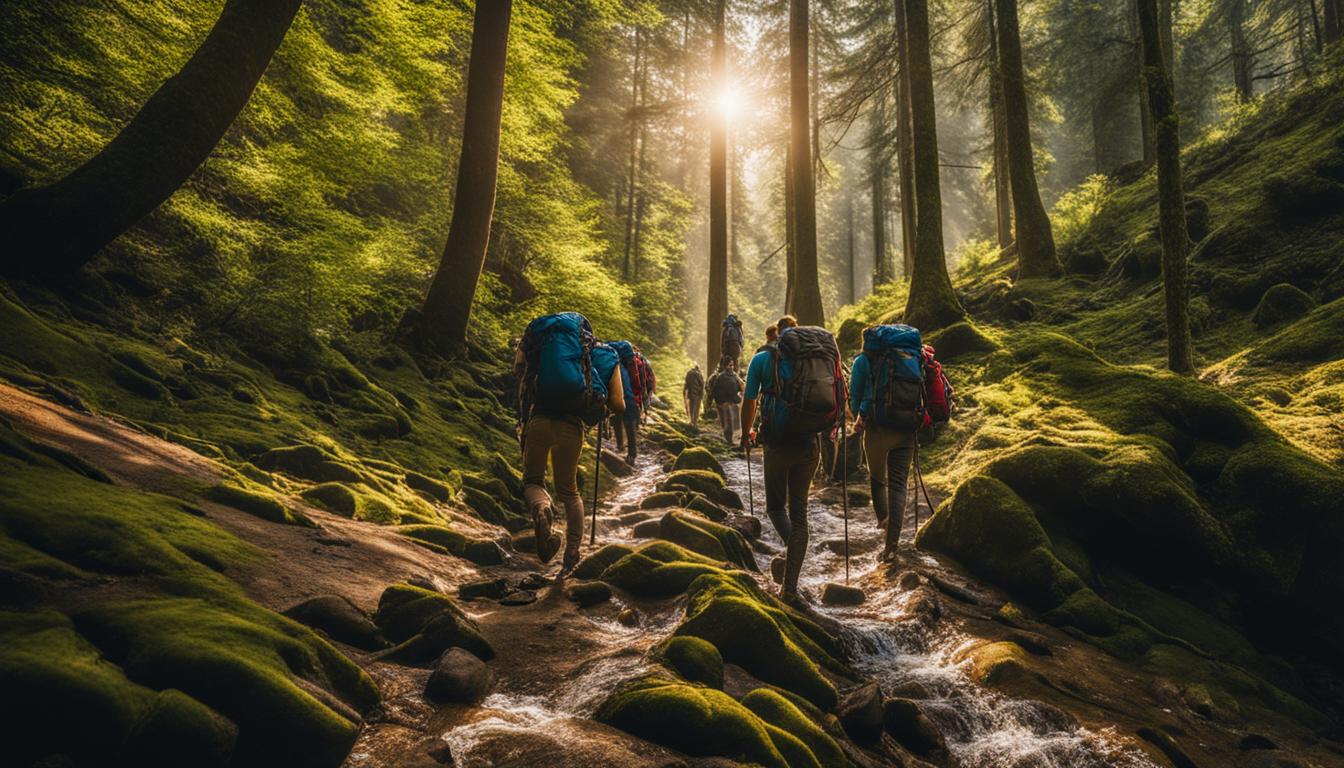As a beginner backpacker, I understand that embarking on your first hiking trip can be both exciting and a little bit daunting. That’s why I’m here to share some valuable tips and advice to help you navigate trails like a pro. Whether you’re new to hiking or just getting started with backpacking, these tips will set you on the right path to a successful and enjoyable outdoor adventure.
Before we dive into the details, let’s take a moment to acknowledge that as a beginner, it’s important to start small and choose easy to moderate trails for your first trips. This will allow you to gain confidence, learn the necessary skills, and gradually build up to more challenging hikes.
Key Takeaways:
- Choose easy to moderate trails for your first backpacking trips.
- Consider your abilities and comfort level when planning your route.
- Research the trail beforehand and have a route planned.
- Use a map and compass, or consider taking a land navigation course.
- Go with someone who has backpacking experience and learn how to use your gear beforehand.
Start Small and Make a Good Plan

As a beginner backpacker, it’s crucial to start your adventures on easy to moderate trails. This allows you to gradually build your skills and confidence before taking on more challenging routes. Starting small also helps you become accustomed to carrying a heavier backpack and understanding your own physical capabilities. Choose short, one-night trips that align with your fitness level and comfort level with certain aspects such as heights or exposure to the elements.
When planning your hiking route, consider selecting a more popular trail that attracts other hikers. This ensures that you’ll have a support network in case you need assistance or encounter any issues along the way. Additionally, opting for well-traveled routes often means that there are established campsites and water sources available, making your trip more manageable and less stressful.
To have a successful backpacking trip, take the time to thoroughly plan every aspect. Research the trail beforehand, noting any potential challenges, weather conditions, and available resources. Create a detailed itinerary, including daily hiking distances, expected camping locations, and estimated elevation gain. By having a well-structured plan in place, you’ll feel more confident and prepared for your adventure.
Essential Backpacking Checklist:
- Backpack: Choose a backpack that fits you well and has enough capacity for your gear.
- Tent: Invest in a lightweight and durable tent that suits your needs.
- Sleeping Bag: Select a sleeping bag appropriate for the expected temperatures.
- Food and Water: Pack lightweight, nutritious meals and carry enough water or a water filtration system.
- Clothing: Bring appropriate clothing layers and rain gear.
- Navigational Tools: Carry a map, compass, and consider a GPS device.
- First Aid Kit: Be prepared for minor injuries and ailments.
- Lighting: Have a reliable headlamp or flashlight.
- Personal Items: Bring toiletries, sunscreen, insect repellent, and any necessary medications.
Remember, starting small and making a good plan are key steps to ensure a successful and enjoyable backpacking experience as a beginner. By gradually increasing the difficulty of your trips and thoroughly preparing for each adventure, you’ll develop the skills and confidence to tackle more challenging trails in the future.
Be Prepared to Navigate

When it comes to backpacking, being prepared to navigate is crucial for a successful and safe trip. Before embarking on your adventure, take the time to research your trip and have a route planned. Knowing where you’re going, how long you’ll hike each day, where you’ll camp, and the elevation gain will help you stay on track.
One essential tool for navigation is a map and compass. Learning how to use them will ensure that you can find your way even without modern technology. Consider taking a land navigation course or practicing with a GPS to enhance your navigation skills.
In addition to a map and compass, it’s a good idea to have a backup plan in case of GPS failure. Pack extra batteries for your GPS and phone if you’re using apps like All Trails or Gaia GPS. Remember, it’s important to be self-reliant and not rely solely on others for directions and navigation. Be an active participant in planning and know where you are at all times.
| Essential Navigation Skills | Why They Matter |
|---|---|
| Research your trip | Knowing the details of your trip will help you plan your route and anticipate potential challenges. |
| Map and compass | Even in the age of GPS, knowing how to use a map and compass is essential for finding your way in any conditions. |
| GPS | A GPS can be a helpful tool for navigation, but it’s important to have a backup plan and additional batteries. |
| Navigation skills | Developing your navigation skills will give you the confidence to explore new trails and navigate any challenges that arise. |
By being prepared to navigate, you’ll have the skills and knowledge to confidently explore new trails and enjoy the beauty of the great outdoors.
How Can Beginner Backpackers and Hikers Share Trails Safely?
When hitting the trails, tips for backpackers and hikers include respecting other hikers by yielding the right of way, avoiding loud noises to not disturb wildlife, and keeping a safe distance from wildlife. It’s also important to pack out all trash and follow Leave No Trace principles to protect the environment.
Conclusion
As a beginner backpacker, I’ve learned that making mistakes is part of the journey. However, with the right advice and preparation, you can avoid some of the most common blunders. One essential skill is knowing how to pack efficiently. Don’t fall into the overpacking trap and instead pack only the essentials. Keep in mind the weight of your gear to ensure a comfortable and enjoyable experience.
Another mistake to avoid is taking on too much, especially when it comes to mileage and elevation gain. It’s important to assess your abilities and choose a trail that matches your skill level. Don’t be afraid to start small and gradually work your way up to more challenging adventures.
Lastly, acquiring and honing essential backpacking skills is crucial. Take the time to learn how to read a map and use a compass. These basic navigation skills will serve you well and provide a sense of confidence when exploring unfamiliar terrain. Consider carrying a GPS as a backup, but don’t rely solely on technology. Remember, being an active participant in planning and navigation is key to a successful backpacking trip.
By heeding this advice and continually improving your skills, you’ll soon become a confident and successful backpacker. Embrace the journey, learn from your mistakes, and enjoy the wonders of the great outdoors!

